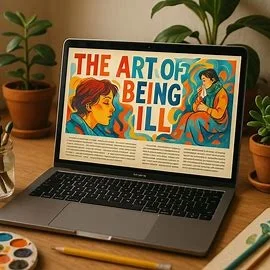Introduction
Illness often feels like an unwelcome interruption. It halts routines, limits energy, and sometimes brings feelings of frustration or fear. Yet, beyond the discomfort, illness can offer an unexpected opportunity—a pause in the relentless pace of life.
The art of being ill is about finding meaning and balance during these difficult times. It’s not about romanticizing sickness but about learning how to respond to it with awareness, compassion, and patience. By doing so, we can turn recovery into a time of inner growth and self-discovery.
1. Reframing Illness as a Part of Life
In a world that celebrates constant motion and productivity, being unwell can feel like falling behind. However, illness is a universal experience; no one is immune to it.
Reframing sickness as a natural phase of life helps us release the guilt and frustration often associated with it. Instead of resisting the situation, we can lean into it—accepting it as an opportunity to slow down, listen to our bodies, and reassess our priorities.
2. The Power of Rest and Stillness
One of the core aspects of the art of being ill is embracing rest. In our busy lives, rest is often undervalued. We see it as a luxury rather than a necessity.
Illness demands rest. By surrendering to it without guilt, we give our bodies the energy they need to heal. Simple acts—like napping without an alarm, enjoying the quiet of a slow morning, or letting go of nonessential tasks—can transform the way we experience recovery.
Rest is not wasted time; it’s active participation in healing.
3. Listening to the Wisdom of the Body
The human body communicates in subtle ways—fatigue, pain, or discomfort are often signals that something deeper needs attention.
Practicing the art of being ill means listening to these signals rather than silencing them with quick fixes. For example:
-
Persistent headaches may highlight stress or sleep deprivation.
-
Low energy could point to nutritional needs or emotional strain.
-
Frequent colds might indicate chronic overwork.
These insights invite us to make meaningful lifestyle changes that promote lasting wellness.
4. Emotional Resilience During Illness
Sickness doesn’t just challenge the body; it affects the mind and spirit as well. Feelings of vulnerability, anxiety, or even boredom often arise during recovery.
The art of being ill encourages us to approach these emotions with acceptance. Rather than fighting them, we can allow them to surface and gently explore their roots. Journaling, meditating, or talking with supportive friends can help process these feelings, making illness a time for emotional as well as physical healing.
5. Finding Meaning in the Pause
Illness often creates an unplanned pause in life’s usual rhythm. While initially frustrating, this pause can become a powerful space for reflection.
Freed from the rush of daily obligations, we can ask ourselves meaningful questions:
-
Are we living in a way that supports our health?
-
Have we been neglecting rest, relationships, or creative pursuits?
-
What changes could lead to a more balanced life after recovery?
This introspection often leads to clarity and purpose, turning sickness into a catalyst for positive transformation.
6. Nurturing Relationships Through Vulnerability
Being unwell often reveals the importance of supportive relationships. Loved ones who check in, offer help, or simply listen provide comfort that accelerates healing.
The art of being ill includes accepting help gracefully. Vulnerability can deepen trust and connection, reminding us that we’re part of a network of care. In return, these experiences often inspire us to be more compassionate toward others during their times of need.
7. Holistic Healing: Beyond Medication
While medical care is essential for recovery, healing often requires more than medicine alone. Holistic practices—such as proper nutrition, adequate hydration, gentle movement (when appropriate), and mental relaxation—play a vital role.
The art of being ill also emphasizes activities that soothe the spirit:
-
Listening to calming music.
-
Practicing mindfulness or light meditation.
-
Reading, writing, or engaging in low-energy creative hobbies.
These approaches support the body while nurturing emotional well-being.
8. Illness as a Teacher
For many, periods of illness become profound teachers. They reveal personal limits, expose unhealthy habits, and encourage gratitude for good health.
People often emerge from these experiences with:
-
A renewed appreciation for simple routines.
-
A commitment to balanced lifestyles.
-
Greater empathy for others facing health challenges.
In this sense, the art of being ill isn’t just about enduring sickness—it’s about learning from it.
9. Practical Steps for Practicing the Art of Being Ill
To embrace illness as a meaningful experience, consider these steps:
-
Acknowledge the situation: Denial often delays healing.
-
Allow rest without guilt: Recovery requires energy.
-
Seek both medical and emotional support: Healing isn’t only physical.
-
Simplify routines: Focus on essentials and delegate tasks when possible.
-
Reflect and adapt: Use the pause to reassess habits and priorities.
By approaching sickness with intention and compassion, we transform it from a passive experience into an active journey of growth.
10. Looking Forward: Carrying Lessons Beyond Recovery
The insights gained during illness often shape healthier, more balanced lives after recovery. We may learn to set boundaries, rest more often, nourish ourselves better, or approach challenges with more patience and kindness.
The art of being ill equips us with tools for self-care that extend far beyond periods of sickness, enriching our overall well-being.
Conclusion
Illness is rarely welcomed, yet it can become a meaningful chapter in our lives. By embracing the art of being ill, we learn to listen to our bodies, honor our need for rest, and reflect on the deeper lessons hidden in vulnerability.
Through this approach, sickness shifts from being merely an obstacle to becoming an unexpected teacher—a guide toward resilience, empathy, and a more mindful way of living.






